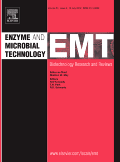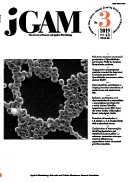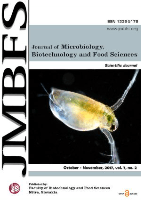
ENZYME AND MICROBIAL TECHNOLOGY
Scope & Guideline
Unleashing the Power of Enzymes and Microorganisms
Introduction
Aims and Scopes
- Biocatalysis and Enzyme Engineering:
Research on the development and optimization of enzymes for various industrial applications, including biofuels, pharmaceuticals, and food processing. - Microbial Biotechnology:
Studies involving the use of microorganisms for the production of valuable compounds, bioremediation, and waste treatment. - Metabolic Engineering and Synthetic Biology:
Research focused on the modification of metabolic pathways in microorganisms to enhance the production of desired metabolites. - Environmental Biotechnology:
Exploration of microbial processes for environmental applications, such as biodegradation and bioremediation of pollutants. - Food and Pharmaceutical Applications:
Investigations into the use of enzymes and microbes in the food industry for fermentation processes, preservation, and the development of functional foods. - Structural and Functional Characterization of Enzymes:
Detailed studies on enzyme structure, mechanism of action, and interactions with substrates and inhibitors.
Trending and Emerging
- Enzyme Immobilization and Nanotechnology:
The integration of nanotechnology in enzyme immobilization techniques is a growing trend, enabling enhanced stability and reusability of biocatalysts for industrial applications. - Synthetic Biology and Modular Enzyme Systems:
Research focusing on synthetic biology, particularly the development of modular enzyme systems for complex bioconversions, is on the rise, reflecting the need for more efficient and tailored biocatalytic processes. - Microbial Consortia and Systems Biology:
Studies exploring the use of microbial consortia and systems biology approaches are emerging, emphasizing the collaborative interactions among different microorganisms to enhance biotechnological processes. - Sustainable Bioprocessing and Green Chemistry:
There is an increasing emphasis on sustainability in bioprocessing, with research focusing on green chemistry principles, waste valorization, and the use of renewable resources in enzyme applications. - Advanced Enzyme Engineering Techniques:
Emerging techniques such as directed evolution and computational modeling for enzyme engineering are gaining popularity, allowing for the design of enzymes with improved properties for specific applications.
Declining or Waning
- Conventional Fermentation Processes:
Research on traditional fermentation methods appears to be waning in favor of more innovative biotechnological approaches, such as synthetic biology and metabolic engineering. - Natural Product Extraction:
Studies focusing on the extraction of natural products using conventional methods are declining as researchers increasingly emphasize biocatalytic and enzymatic methods for improved efficiency and sustainability. - Single Enzyme Applications:
There is a noticeable reduction in studies solely focusing on the application of single enzymes, as the trend shifts towards using enzyme cocktails or multi-enzyme systems to achieve more complex transformations. - Basic Microbial Physiology:
Research that primarily explores microbial physiology without direct application to biotechnology or industrial processes is becoming less frequent, reflecting a shift towards applied research.
Similar Journals

JOURNAL OF BASIC MICROBIOLOGY
Pioneering Research for a Healthier TomorrowJOURNAL OF BASIC MICROBIOLOGY is a premier publication in the field of microbiology, published by WILEY since 1985. With a significant presence in Germany, this journal encompasses a wide spectrum of research topics, focusing on applied microbiology and biotechnology as well as diverse areas within medicine. Holding a commendable Q2 ranking in both its categories for 2023, it plays a crucial role in disseminating innovative findings and methodologies to the community. Researchers will find it to be an essential platform for sharing high-quality work, where it currently stands at rank #47 in the applied microbiology and biotechnology category, representing the 63rd percentile among international journals. The JOURNAL OF BASIC MICROBIOLOGY caters to a growing audience of professionals and students, offering insights essential for advancement in microbiological research and its applications. While it does not currently offer an Open Access option, it remains an influential outlet for academic excellence, continuously contributing to the development of the field through its rigorous peer-reviewed articles.

Synthetic and Systems Biotechnology
Empowering Global Access to Groundbreaking ResearchSynthetic and Systems Biotechnology, published by KEAI PUBLISHING LTD, is a pioneering open-access journal that has made significant contributions to the fields of applied microbiology, biotechnology, biomedical engineering, genetics, and structural biology since its inception in 2016. With an ISSN of 2405-805X, this journal is committed to fostering innovative research and interdisciplinary collaboration, providing a platform for the dissemination of high-quality studies that push the boundaries of scientific knowledge. Recognized for its excellence, it holds prestigious Q1 rankings in both Applied Microbiology and Biotechnology as well as Biomedical Engineering in 2023, alongside notable Q2 rankings in Genetics and Structural Biology. Researchers, professionals, and students alike can access cutting-edge research that explores the dynamic interplay between synthetic biology and systems biology, driving advancements that could reshape health, industry, and environmental sustainability. By operating under an open-access model, Synthetic and Systems Biotechnology ensures that new findings are accessible to a global audience, thereby maximizing the impact and reach of the published work and paving the way for future discoveries.

JOURNAL OF GENERAL AND APPLIED MICROBIOLOGY
Bridging theory and application in microbial science.JOURNAL OF GENERAL AND APPLIED MICROBIOLOGY, published by the MICROBIOL RES FOUNDATION, is a vital resource in the fields of applied microbiology and biotechnology, as well as in diverse medical applications, serving an academic community dedicated to advancing microbial science. Established in 1955, this journal has a rich history of disseminating innovative research and insights into the intricate world of microorganisms. With an ISSN of 0022-1260 and an E-ISSN of 1349-8037, the journal maintains high scholarly standards and robustness, reflected in its 2023 Scopus rankings placing it in the Q3 and Q4 quartiles within its categories. While primarily based in Japan, the journal engages a global audience, offering valuable contributions that inform both theoretical perspectives and practical applications in microbiology. Despite being a non-open-access publication, it provides pivotal research findings essential for academics, professionals, and students alike, fostering a deeper understanding of microbial impact on health and the environment.

Journal of Microbiology Biotechnology and Food Sciences
Innovating solutions for a sustainable future in food and biotechnology.Journal of Microbiology Biotechnology and Food Sciences, published by SLOVAK UNIV AGRICULTURE NITRA, is a distinguished open-access journal dedicated to advancing scholarship in the interrelated fields of microbiology, biotechnology, and food sciences. With an ISSN of 1338-5178, this journal has been accessible to researchers worldwide since 2011, providing a platform for innovative studies that contribute to the understanding of microbial processes, biotechnological advancements, and food science applications. As reflected in its 2023 category quartiles, the journal holds notable positions in Biotechnology (Q3) and Food Science (Q3), and while it ranks in the lower quartiles for Microbiology (Q4) and Molecular Biology (Q4), it is committed to enhancing its impact within these domains. The journal encourages the submission of high-quality research articles, reviews, and short communications that address critical issues in these fields, making it an essential resource for academics, industry professionals, and students alike. Emphasizing both foundational research and practical applications, the Journal of Microbiology Biotechnology and Food Sciences stands as a vital contributor to the scientific discourse, fostering innovation and collaboration among researchers aiming to solve pressing challenges in food safety, biotechnology development, and microbial studies.

JOURNAL OF BIOSCIENCE AND BIOENGINEERING
Transforming knowledge into impactful innovations.The JOURNAL OF BIOSCIENCE AND BIOENGINEERING, published by the SOC BIOSCIENCE BIOENGINEERING JAPAN, is an esteemed peer-reviewed journal dedicated to advancing knowledge in the fields of applied microbiology, biotechnology, and bioengineering. With its ISSN of 1389-1723 and E-ISSN 1347-4421, this journal has been providing a platform for innovative research since its inception in 1991, maintaining its relevance through periodic updates and a scope that encompasses various aspects of bioscience and engineering. The journal boasts a notable impact factor, reflecting its contributions to the Q2 and Q3 quartiles in relevant categories as of 2023, which positions it amongst the well-regarded publications in its field. Researchers and professionals can access its rich archive through open access options, ensuring wide dissemination of pivotal studies. With its address rooted in Osaka University, Japan, the journal serves as a vital resource for scientists and scholars committed to pushing the boundaries of biosciences and engineering.

JOURNAL OF INDUSTRIAL MICROBIOLOGY & BIOTECHNOLOGY
Exploring Innovative Solutions for a Sustainable FutureJOURNAL OF INDUSTRIAL MICROBIOLOGY & BIOTECHNOLOGY, published by Oxford University Press, is a vital resource for researchers and professionals actively engaged in the fields of applied microbiology, biotechnology, and bioengineering. With an ISSN of 1367-5435 and E-ISSN of 1476-5535, this journal has established itself as a leading platform for disseminating innovative research findings and advancing knowledge in industrial microbiology since its inception in 1996. As of 2023, it is classified in the Q2 quartile across multiple categories including Applied Microbiology and Biotechnology, Bioengineering, and Medicine, underscoring its significance in the academic community. Notably, it ranks 26th of 127 in Applied Microbiology and Biotechnology, placing it in the 79th percentile, indicative of its high impact and influence. Although it does not currently offer Open Access, it remains a key outlet for high-quality scholarly articles that align with the objectives of improving industrial practices through biotechnological applications. For those interested in the latest developments and methodologies within the realm of applied microbiology and biotechnology, this journal serves as an indispensable reference.

APPLIED AND ENVIRONMENTAL MICROBIOLOGY
Fostering Sustainable Practices Through Cutting-Edge ResearchApplied and Environmental Microbiology, published by the American Society for Microbiology, stands as a leading journal in the fields of applied microbiology and environmental science since its inception in 1976. With a prestigious Q1 quartile ranking across multiple categories including Applied Microbiology and Biotechnology, Ecology, and Food Science, this journal consistently disseminates high-impact research that drives innovation and advances our understanding of microbial interactions within our ecosystems and industries. As ranked by Scopus, it exhibits prominent rankings in various related fields, underscoring its critical role in shaping contemporary microbiological research. Researchers, professionals, and students alike can stay abreast of groundbreaking studies while contributing to a vast body of knowledge that spans diverse aspects of microbiology, biotechnology, and ecology, ultimately contributing to sustainable practices. Join the community of dedicated scholars and explore vital research findings that impact both environmental health and technological advancement.

JOURNAL OF MICROBIOLOGY
Fostering interdisciplinary dialogue in microbial sciences.JOURNAL OF MICROBIOLOGY, published by the Microbiological Society Korea, is a prestigious peer-reviewed journal dedicated to the advancement of knowledge in the fields of microbiology, applied microbiology, and biotechnology. Established in 1996, this journal serves as a vital platform for researchers and professionals from around the globe to disseminate their findings and engage in multidisciplinary discussions pertaining to microbial sciences. With an H-index that reflects its impact, the journal holds a commendable Q2 ranking in key categories including Applied Microbiology and Biotechnology, as well as Medicine (Miscellaneous), which underscores its significance in the academic community. Despite being a subscription-based journal, the JOURNAL OF MICROBIOLOGY aims to contribute to the understanding of microbial processes and their applications, facilitating advancements that are essential in health, industry, and environmental sciences. Researchers, students, and practitioners are encouraged to explore this rich resource for the latest research and trends in microbiology.

Research Journal of Biotechnology
Catalyzing discoveries in biotechnology and beyond.Research Journal of Biotechnology is a premier publication dedicated to advancing the field of biotechnology through the dissemination of impactful research articles. Published by Research Journal Biotechnology in India, this journal operates under an Open Access model, facilitating unrestricted access to high-quality research for researchers, professionals, and students worldwide. With an ISSN of 2278-4535 and an E-ISSN of 2278-4535, the journal aims to serve as a comprehensive platform for innovative studies in Applied Microbiology and Biotechnology, Bioengineering, and Biotechnology. Despite its current Q4 quartile ranking in these categories, the journal aspires to extend its influence and visibility in the academic community, aiming for greater impact in the future. The journal features research articles that span a wide array of topics in biotechnology, fostering a collaborative and knowledge-rich environment for national and international scholars. We invite you to explore, contribute to, and engage with the expanding landscape of biotechnological research through the Research Journal of Biotechnology.

APPLIED BIOCHEMISTRY AND BIOTECHNOLOGY
Connecting Science and Technology for a Better TomorrowApplied Biochemistry and Biotechnology is a leading journal published by Springer, dedicated to advancing research in the interdisciplinary fields of biochemistry, biotechnology, and applied microbiology. Established in 1981, this peer-reviewed journal covers a wide range of topics that encompass innovative techniques, methodologies, and applications of biochemistry and biotechnology in medicine, environmental engineering, and molecular biology. With a Q2 ranking in several categories and an increasing impact factor, the journal demonstrates significant influence and credibility within the scientific community. While traditionally subscription-based, the journal offers avenues for open access through selective agreements, making high-quality research accessible to a broader audience. Researchers, professionals, and students alike will find Applied Biochemistry and Biotechnology to be an invaluable resource for the latest developments and applications in biochemistry and its related fields, aiding in the quest for sustainable solutions and novel biotechnological advancements.